I tend to over romanticise a lot of experiences while travelling. It happens more often when I can see myself writing about those experiences online; as soon as something exciting happens, I start to picture it in blog terms. And then I expect it to fit all my wildly imagined preconceptions.
Take my Easter weekend in Jardin, Colombia, for instance.
Easter in the little pueblo of Jardin, Colombia
Being an atheist, I hadn’t planned on celebrating the holiday itself, but I figured it would probably be a big deal for Colombians. And after spending my week at the newspaper researching the various ways Colombians celebrate Easter week for an article, I was expecting something seriously exciting.
At the very least, something blog post worthy.
Read more: Everything I’ve Learnt About Backpacking Colombia
We decided to go to Jardin, a small town a few hours drive away from Medellin which boasts verdant green valleys, imposing mountains, and an atmosphere that’s apparently gone unchanged for more than a century.
After a bus journey of such twisting proportions that I passed out from all the ‘circular breathing’, we reached the hostel I’d booked; a few minutes walk out of the centre, down a rock strewn road and under a beautiful wooden archway. I was immediately smitten, and was eyeing up the hammocks when the owner greeted us at the door, a bemused expression on her face.
“You have a booking? No, you can’t… I have no space here…”
After a conversation that grew increasingly more like an argument with my spluttering Spanish, the situation became clear. I’d phoned to reserve our beds a few days before, and the owner had wanted a bank deposit, which I wasn’t able to make. Instead, we arranged that I would repeatedly reconfirm the booking via email so when I hung up the call, proud of another Spanish-only conversation, I sent her an email right away, as well as a few more over the next days.
Except when we arrived, it turned out she hadn’t bothered to check her emails, and had given away our beds.
An early Easter disaster
The fact that she took no responsibility for her screw-up was one thing, but there was another element of the situation that had me getting panicked. The small town of Jardin, busy enough each weekend with city visitors keen on a few days of relaxation amongst green hills and clean air, was filled to the brim on Maundy Thursday in preparation for the approaching Easter weekend.
I knew the town was particularly brim filled because we’d looked everywhere online for space, and almost every hostel was booked out. Luckily, noticing my desperate expression, the hostel owner mentioned that she had friends nearby who rented out rooms in their finca.
Did we want to stay there instead?
If you didn’t already know, Colombians are incredibly friendly. To a point where they’ll meet you on a beach and invite you to live with them for a week, or – in this case – happily accommodate two gringos they don’t know, despite it being Easter weekend.
Soley was from Pasto in the south of Colombia, but had met her Spanish husband in Barcelona. Her words tumbled from her mouth as she poured us glasses of cafe tinto before we’d even sat down at the family table.
A man appeared in the living room; declared that his wife was a headache and wished us good luck. He then proceeded to kiss both my cheeks and offered me a biscuit.
You can imagine where my thought process went, right? There we were, staying in the house of an incredibly welcoming family during a Colombian holiday – it was virtually guaranteed that we were going to be invited to spend Easter with them. I could barely contain my excitement.
The excitement had dissipated somewhat by the next morning, when we awoke in the bottom of a bunkbed – a double bed bunkbed, to be specific – while Soley’s twenty-something daughter and her boyfriend whispered together above us. A miscommunication in our Spanish the night before had led me to think we were simply staying in Soley’s daughter’s bedroom – not sharing it with said daughter.
Before I’d had a chance to broach the “hey! we’re the strangers crashing in your room!” conversation, Soley popped her head round the bedroom door.
“Todo esta bien?” she said chirpily.
She and her husband were taking the dogs for a walk, along with their family friends from Medellin who’d arrived the night before. They’d stop somewhere for lunch, up in the hills. Did we want to go with them?
I was immediately keen.
“This is how we get an invite to Easter!” I whispered to Josh. “Si, gracias – queremos ir por un camino con ustedes!”
Soley beamed, and her head disappeared from the room.
***
We walked along hilly roads and across crumbling bridges. We stopped for beers above a river, played with Soley’s two soaking wet dogs – giant retriever/labrador mixes that were unbelievably still just a year old – and then we walked some more, uphill through something resembling jungle and out through the fields, watched by rows of placid donkeys.
Eventually we reached the main draw of the afternoon: a trout farm/restaurant. For two hours, through a rainstorm, the ensuing weak sunshine and a lot of “why are we waiting” beers, we stared agonisingly at the kitchen for what ended up being a rather tasty trout lunch.
By the time we stopped at a bar back in Jardin for mojitos, I’d realised that my recently formed dreams of a Colombian family Easter probably weren’t going to happen. There simply didn’t seem to be any specific enthusiasm about the event.
A day of exploring in Jardin, Colombia
The next day, Josh and I set out to discover Jardin for ourselves. We rode the teleferico up above the town, wandered through bushes dripping with coffee beans and pondered the consquences of stealing an abandoned rickshaw on a hillside, with only the grazing horses to see us.
Later, we headed for Jardin’s famous plaza for a bit of people watching, but as the rainclouds quickly gathered and the air grew heavy, we raced for the inside safety of a bar. Sitting at a table in the window gave us even better views – both of the locals racing to save themselves from the downpour, and of the smooth grey cathedral rising up in front of us.
By the time we were eating dinner, I felt a little miserable. My spirits had been slightly dampened by the constant rain, but I also couldn’t shake the feeling that Easter was being wasted. Last year I’d spent the occasion on a beach in Ecuador in a completely religion free setting. What was the point of coming to a tiny Colombian village for Easter if nothing Easter-related was even happening?
The plaza was crowded with people as we began the walk back to Soley’s. The streets were busy too, lined on each side with patient figures. And then I stopped.
An evening parade at Easter in Colombia
At first glance, I assumed we’d stumbled on a funeral procession. Groups of people dressed in black, children in long robes, all waiting for something.
But then there was a sound behind us, something approaching, and we turned to see a strange mass coming towards us. We were still standing in the middle of the street: I dragged Josh quickly in the direction of the pavement.
When an ornately decorated glass box passed by, carried high above the heads of the crowd surrounding it, I finally realised it was Good Friday, and the figure inside the box wasn’t a human but a statue of Jesus.
The box was held aloft by red hooded men; surrounded by children in white; followed by crowds of solemn Colombians and a number of musicians, their instruments held tightly but remaining silent.
Behind them, a line of men walked slowly, shading their open flamed candles from the light breeze. All around us was a sense of melancholy.
The smoke from the swinging incense burners lent an eerie atmosphere to the half lit street – that, and the total silence, which was eventually broken by one thin, reedy voice. Somewhere, a priest was singing.
The crowds gathered themselves around us, moving almost as one. Without even realising it, we were swept up into the procession. Walking steadily amongst hundreds of devout Christians, Josh and I (both self-proclaimed atheists) looked at each other.
“How exactly did we get ourselves into this?”
Thin whispers of music threaded their way through the bodies. The musicians began to play; a sombre melody that few voices lent harmonies and lyrics to. A group of older Colombians stopped and sang to each other, in a circle, facing inward.
The red hooded men shifted the weight against their shoulders, and turned down a side street, bearing Jesus aloft. Close behind him, two upright statues wobbled slightly as their bearers reached the same corner. Under a streetlamp they looked almost holy.
***
On Easter Sunday we caught the bus back to Medellin. We said goodbye to Soley and her family at midday – who were all still in their pyjamas – and I marvelled at my earlier expectations.
Why had I assumed that every Colombian family was going to celebrate Easter just because I wanted them to? What had I even wanted, anyway? An “authentic” experience? Something that not every tourist would automatically have?
Not exactly the Easter I’d had in mind…
Unexpectedly enough, it was Jardin itself that gave me a real idea of a Colombian Easter; the town as one being, one movement that trudged solemnly through the streets, all candles and solemn expressions, white robes and red hoods.
It didn’t matter that Soley and her family hadn’t been as religious, as ‘Easter-like’, as I’d hoped. What I’d seen instead was the absolutely unchanging nature of Jardin – the swollen clouds, the faded colours, the sombreros, and the men rocking back on their chairs in the sun, in the rain, whether on Good Friday or a random Tuesday.
And a couple of tourists sitting at the edges, somehow becoming part of it all. If only for Easter weekend.

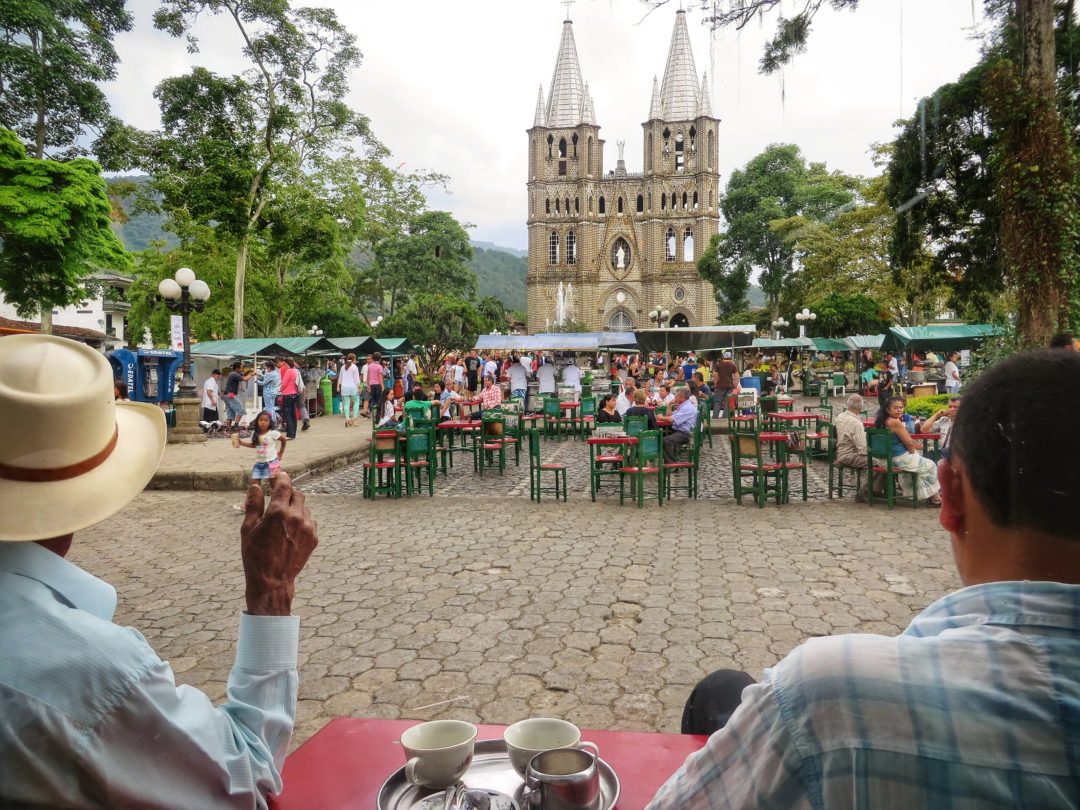






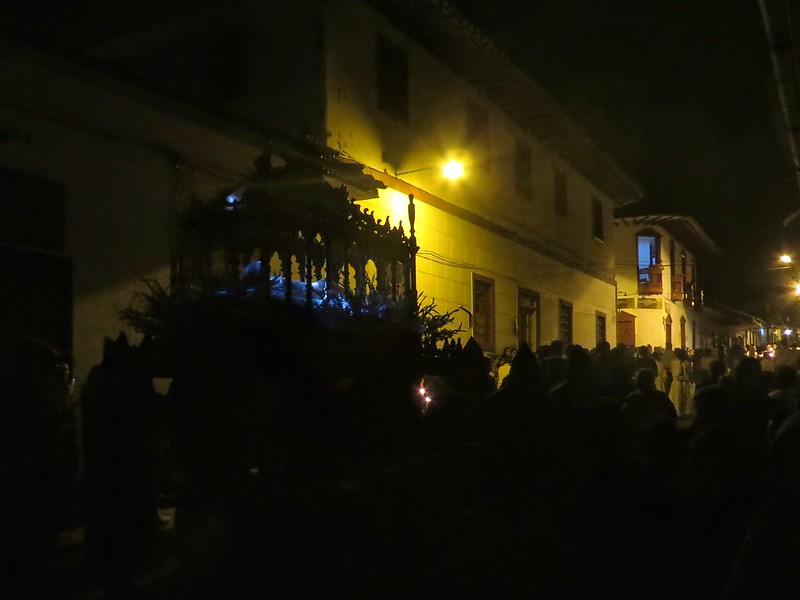




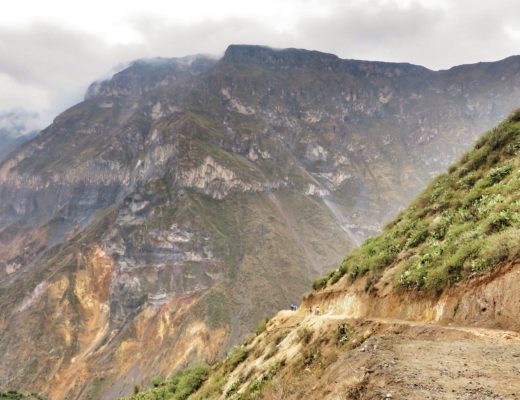
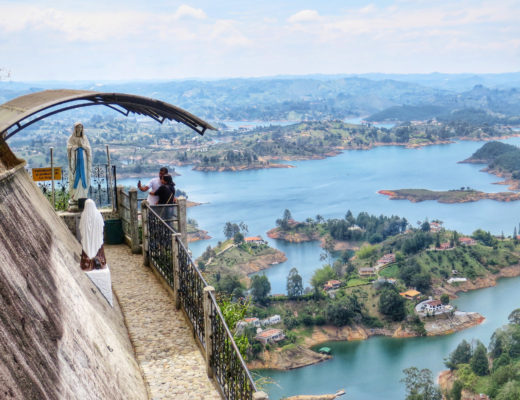
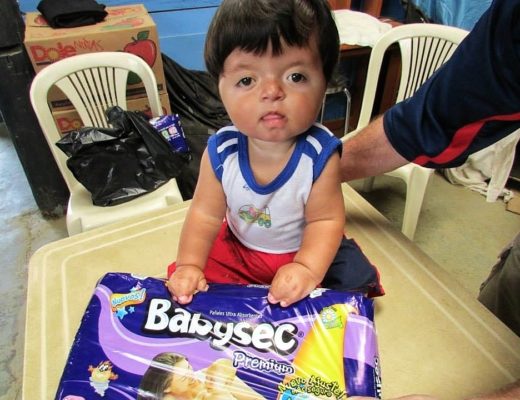
2 Comments
Suki F
May 17, 2014 at 12:59 amThese processions can be seen all over Latin America for Easter. But among the ones I have seen, the processions of Guatemala are the grandest.
Flora
May 18, 2014 at 11:29 pmI haven’t made it to Guatemala yet, Suki, but I definitely plan on heading there at some point in the near future.